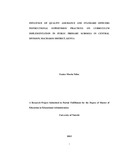| dc.description.abstract | The study investigated the influence of Quality Assurance and Standards officers’
instructional supervision practices on curriculum implementation in public primary
schools in Central division, Machakos district, Kenya. It was guided by the following
variables as the research objectives; professional guidance to teachers on time
management, provision of in-service training on effective teaching and learning methods,
checking of teachers’ professional documents, giving feedback after instructional
supervision. The study employed descriptive survey research design and the target
population comprised of 72 public primary schools, thus, the research used a sample of
29 public primary schools that were stratified sampled based on the head teachers’
gender. The study sample population comprised of 29 headteachers, 282 teachers and one
QASO. Data was collected using questionnaires for teachers and headteachers and an
interview guide for the QASO.
Study findings reveal that QASOs monitors how teachers observe time in every subject
they handle and how they keep time planning carrying out instruction in classroom.
QASOs are supposed to ensure that all parts of lesson plan takes the time allocated for
each part effectively. Majority of the teachers (62.4%) indicated that they had never been
supervised by QASO in their instructional process, QASOs who stated that they only
visited schools once per term.
Teachers should be given in-service training in various subjects’ mastery and
rationalization the curriculum with aim of improving teaching methodologies. The study
findings show most of the headteachers (41.4%) indicated that QASOs sometimes offer
professional guidance to teachers on effective curriculum implementation. The in-service
courses offered were reported to be of repeated context thus more need to be done to
improve on the quality of in-service offered. Induction of new teachers and headteachers
on effective curriculum implementation and smooth school running to boost their
professional performance.
Post conferencing after classroom observation where both the QASO and teacher discuss
the results and remedial action should be done. Most of the head teachers indicated that
QASOs give feedback while majority of the teachers due to the fact that they had never
been supervised indicated that feedback was not given. This was confirmed by the QASO
who indicated that due to the vast workload and scarcity of time they gave observation
reports to the head teacher.
Majority of the teachers indicated that they benefited through team building and
worked in collegiality due to their interaction with QASOs. Most of the teachers fear
discouraging remarks from QASO infront of the pupils or fellow teachers. They also do
not like harassment and abusive language during supervision. Others indicated that
xvi
teachers are uncomfortable when they teach within the presence of QASO. Most of the
head teachers indicated that teachers had negative attitude towards instructional
supervision by QASOs due to fear of being intimidated by the unfriendly supervisors.
They also indicated that teachers were usually not prepared for lessons with the right
professional documents and also the presence of QASO in class distracted pupils
attention in class since they kept looking at him thus failing to get the lessons concept.
The head teachers indicated that QASOs need not to come to schools to carry out
instructional supervision unannounced but rather on early notification, they should also
create cordial relationships with teachers by addressing viewed issues with teachers
outside classroom in the absence of the pupils. QASOs are supposed to conduct proper
induction to both head teachers and teachers while the teachers are to be encouraged to
prepare professional records onto only for inspection but for smooth teaching process.
The teachers should be sensitized on the importance of instructional supervision in their
career development, this will guide the teachers on how to carry out their duties
effectively. The study further recommended that Quality Assurance and Standards
Officers should use friendly approaches on their instructional supervision duties. The
school community should be educated on the use of supervision on their schools’
performance | |

